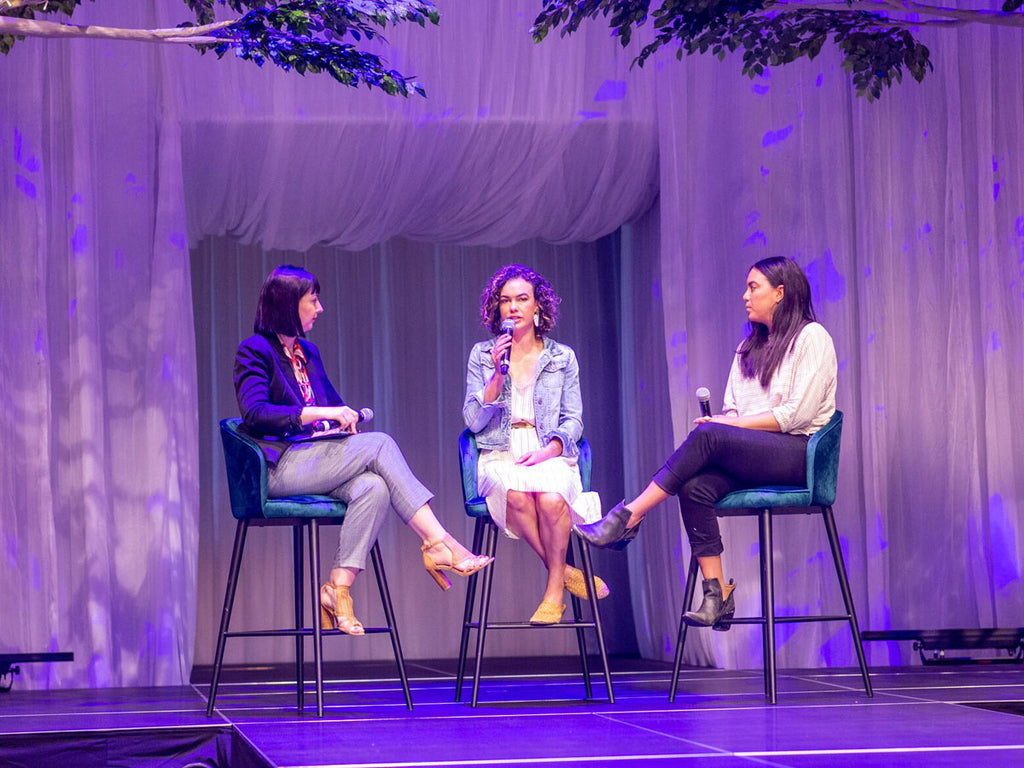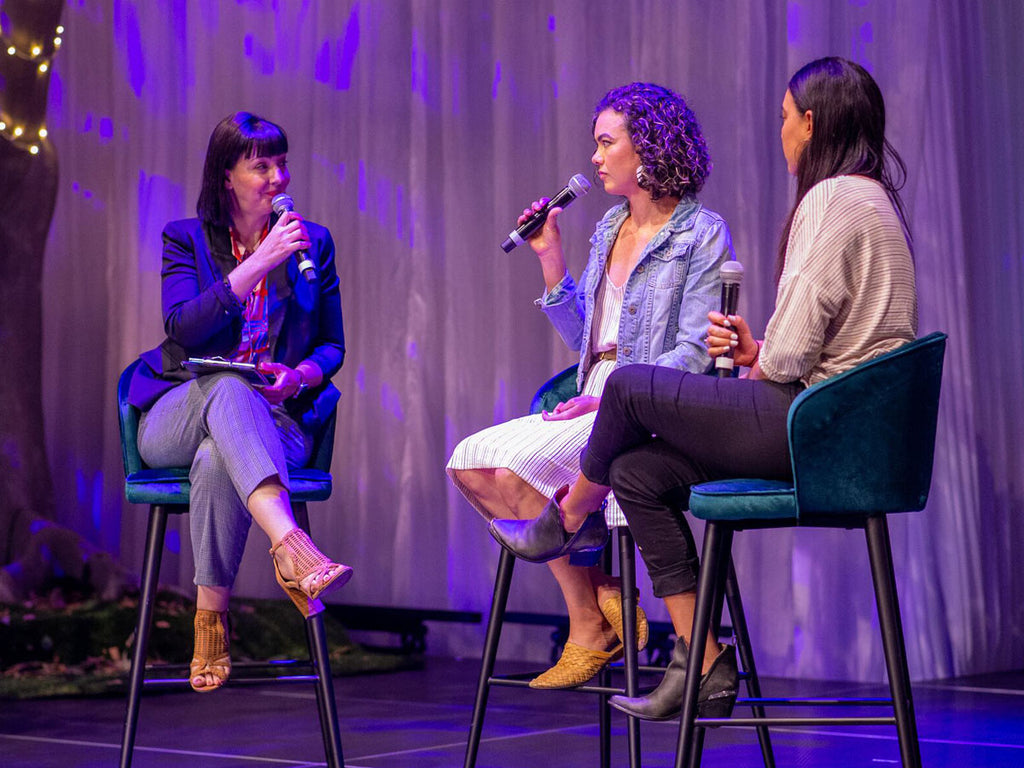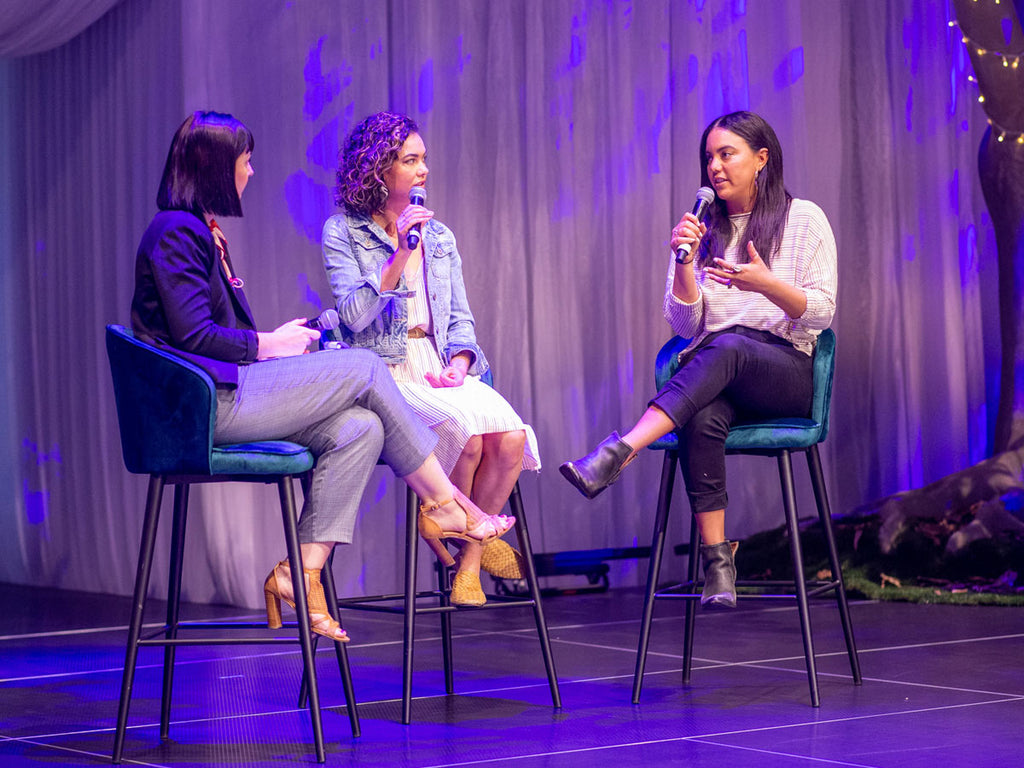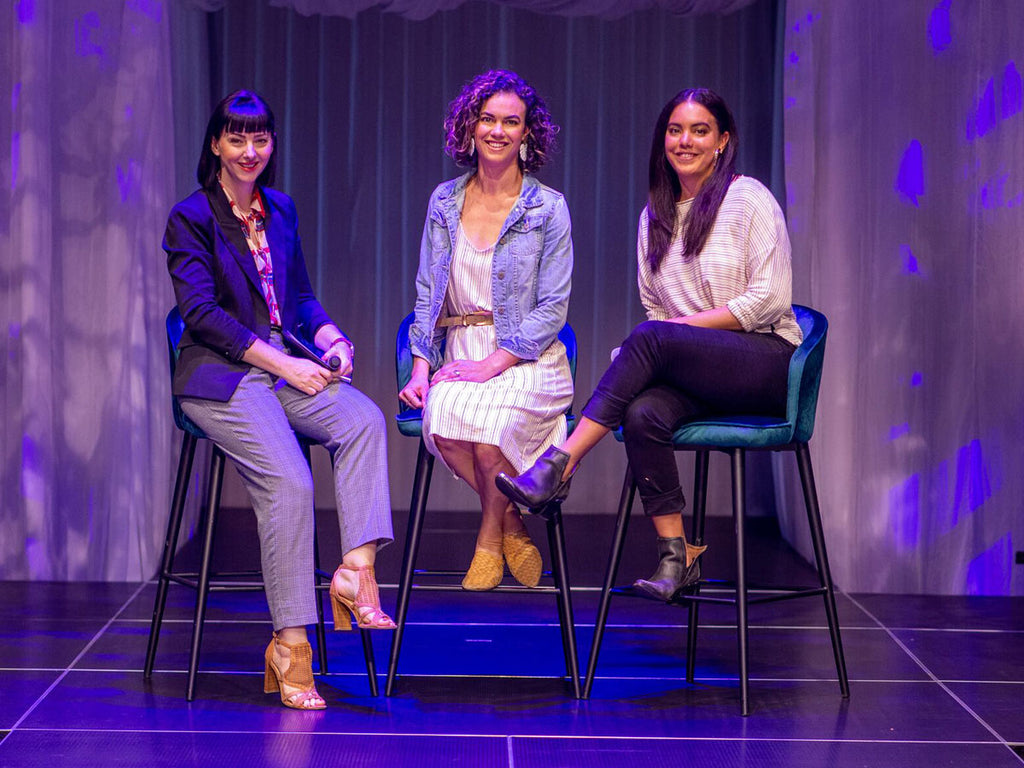Ekka Q & A with Laura Churchill

In August, we were lucky enough to be invited to sit down on stage with Laura Churchill, one of Brisbane's best stylists and a creative powerhouse to discuss all things ethics and sustainability, market trends and the growth of the slow fashion market segment.
The chat was part of Laura's brainchild, the 'Conversation Series', during The Ekka's Natural Fibres Runway Showcase (Laura's the show director), featuring some great local labels, all who produce with natural fibres like cotton, linen and silk.
Safa and I love the opportunity to talk about what we do and why so we were super excited to take the stage with Laura, despite the nerves. Here's a rundown of our chat.
Safa and Desta tell me how The M|N|ML got started and more about your focus for the brand?
Safa
I had been designing and making pieces from organic cotton, silks and leather in the years leading up to the creation of THE M|N|ML.
Desta and I got chatting about the lack of well made, stylish, organic cotton clothing for women and the desire to find clothes that we could use as the base for styling with our own tastes (big earrings, lipstick, accessories) that didn't have a negative impact on the environment or the people making them.
Desta
I have a background in journalism, media and marketing and with Safa's experience in the fashion and design industry, forming a partnership seemed to be a natural step for us. When we started to plan our brand in 2015 we found common ground in wanting to do things differently; we felt that the fashion industry was in desperate need of a shake up when it came to ethics and sustainability.

There was a gap in the market; we wanted to dispel the common perspective that ethical/sustainable fashion wasn’t cool or had a certain look. Though we're only a small brand with minimal impact, we still wholeheartedly believe in everyone's ability to create change.
Our name, THE M|N|ML, is inspired by the minimalist approach both to fashion and to consumption: we strive to simplify how we dress while still being fun and we really want our actions to lessen the impact on the world around us.
Safa
Operating an ethical and sustainable business was and still is the core value of THE M|N|ML but making beautiful clothes is also one of our main goals and we believe the two should be intrinsically linked. Thankfully, the industry/market has started to shift to a more conscious and aware market, we have been able to shift our focus to a broader range of styles and fabrics without sacrificing our ethos and values.
Tell me about your definitions and standards around sustainable fabrics and ethical production because these are things that are often interpreted differently and don’t have a specific industry standard, is that right?
Safa
Slow fashion as a category is still developing but there are definitely industry standards when it comes to certifications and accreditation.
The level of sustainability and ethics differ from brand to brand and that's when it can get tricky/ unclear. Consumer understanding still somewhat limited and from label to label you’ll find different standards. Because consumer understanding is quite low it means big brands are adopting slow fashion language for their marketing, without having to adhere to actual standards. Confusing for buyers and its important for consumers to look deeper into it.

Desta
We define sustainability as the environmental impact of fashion production and ethical fashion refers to the human aspect of the supply chain: that is the production policies and factory standards affecting the people working to make clothes. Things like living wages, anti-slavery and anti-discrimination policies, child-labour free etc.
For us, transparency is about a brand’s willingness and openness to talk about how, where and by who clothes are made. There are a few different, overlapping certification types (from fabric type to production standards).
In Australia that includes but isn't limited to:
– Ethical Clothing Australia who look at the production and manufacturing process of Aus made brands and;
– ACO, which certifies organic production of food, goods and fibres.
For brands that are manufactured overseas, the certifications to look out for are:
- Fair Trade: advocates for better working conditions and improved terms of trade for farmers and workers in developing countries. The Fair Trade mark also ensures that the company has met certain social, environmental and economic criteria for their business operations.
- Fair Wear Foundation, an independent non-profit organization that works with factories to improve labour conditions for garment workers.
- Worldwide Responsible Accredited Production (WRAP) certified factory produced clothing;
- Sustainability in fabrics and fibres can come under a couple of different certs including Global Organic Textiles Standards (GOTS), OEKO-TEX and Bluesign relates to dyes.
We only work with companies and factories that have these standards or accreditations and aim to work towards these certifications ourselves.
We mentioned you produce the majority of your garments in Australia, which is about supporting the local industry but also I understand because factory minimums offshore can be quite high, can you talk about that?
Safa
We made the choice to produce locally for a few reasons:
- logistics (easier to access the factory etc);
- quality control and;
- less cultural barriers to contend with while we were establishing.
The overseas factory MOQs (minimum order quantities) were certainly a factor but we had a personal relationship with OCC Apparel – one of Australia’s only ACO and ECA certified cut-make-sew factories. It made the choice easy as the minimums weren’t as high.
It's also worth pointing out that we don’t think that the answer to the ethical question is to bring everything onshore; there's definitely a way to do ethical production overseas and often ending the reliance on overseas industries can just leave the door open for other problems to replace the current ones.
Are those certifications hard to apply for?
They are really rigorous so it can be a big undertaking for small brands to tackle, especially while juggling the day-to-day! Selecting one or the most relevant for your business is also a bit of a task.
What sort of challenges do you come up against with sourcing fabrics that work well for your pieces but also meet your standards for traceability and organic manufacture?
- Experimenting can be limited because we can only use certain fabrics
- Parsing information about where fabrics come from, how they are grown, the standards and certifications is another challenge etc.
I used to design a range and then source fabrics but now I'm finding my process has been flipped on its head. Now, I source a fabric that ticks all our boxes and then start designing.

I know you work a lot on building a community around your brand. Can you explain why this is important and how you go about doing that?
Desta
There’s such a strong and passionate community around the ethical and slow fashion movements so its super important for small brands like ours to have a two-way conversation. Because there’s so much education and behaviour-change involved in shopping ethically we want our interactions with customers to be open and meaningful. But we never want to talk down or preach. We’re passionate about the issues but also aware that everyone is at a different stage of their ethical fashion journey. We feel like we’re all on this journey together – none of us, as consumers, are perfect so it’s nice to build a community around the challenges of living life in a less negatively impactful way.
We want to inspire and encourage consumers to start questioning where and how their clothes are made so they can make more informed choices and use the power of their dollar to make change. Consumption of any kind has an impact so we think the one of the solutions is to move towards more conscious consumerism.
Developing online and offline community is also important. Online and e-commerce is great for small brands but we still see value in face-to-face like market stalls and pop-up events. There's a big difference between fast-fashion and slow-fashion consumers. The online space lends itself well to the trend-driven, image-focused nature of fast-fashion so establishing a community online is a bit easier for these kinds of brands.
We find slow fashion buyers are a bit more considered when buying and appreciate the opportunity to touch and see pieces and have conversations in real life to get a connection to the brand. Especially when the price point is a touch higher.
In terms of meeting the market for sustainable and ethical fashion, can you explain what market is there and anecdotally what you find your customer is asking for and what their feedback is about that focus of your label?
Desta
Our experience is that the market currently is small, but demand is definitely growing globally for ethics and sustainability in fashion. A University of Cambridge report from 2018 found that ethics and sustainability is now one of the top five considerations when purchasing fashion for 57% of consumers and another recent report from a British ethical consumer guide says the ethical clothing market has increased by almost 20% just in the last year. The numbers are starting to stack up, which is really encouraging.
Anecdotally, it's been interesting to see the evolution of the market in the last 4-5 years. There were only a handful of brands that mentioned ethics or sustainability when we started and it certainly wasn't in the mainstream lexicon. But interestingly enough, as some of the bigger brands have jumped on the bandwagon, it has prompted consumers to start asking questions about where and how their clothing is made. Positive flow on for us: increased awareness means more understanding of our brand philosophy and now we no longer need to explain what ethical fashion is, or rationalise our higher price point.
Increasingly, our customer is looking for clothing made from natural fibres like cotton and linen that can biodegrade, that are well made with good design sensibility, and can be worn over and over regardless of seasons.
Safa you also have a retail store The Common Thread at Bulimba which stocks a collection of sustainable fashion brands. Do you find the majority of your customers are really seeking out brands that meet those standards?
There is definitely a demographic of customers that are seeking well made brands, and having a physical store has meant that I've also been able to introduce these brands to the community at large. I have a lot of people from the local area and beyond who don’t necessarily come seeking an ethical and sustainable shopping experience, but once they pop in and are introduced to the concept of the store they become really intrigued and engaged. On the other hand I have people who happen upon the store and are familiar with a couple of the brands I carry which is great to see. Brands like Veja for instance is one that people have been excited to see in real life as majority of stockists are online only, so being able to have the brand in the local community is something customers have been excited about. As I’ve become established, and the community becomes more aware of The Common Thread and the brands I carry, they are starting to seek out the opportunity to see these products in real life.
One thing I’ve found really interesting is that there is a large group of young mothers or mothers to be who are seeking more ethical and sustainable choices. I have a mix of womens and children's wear, with the majority of stock being kids gifts and clothing, so I do attract that clientele, but it’s been really cool to see people buying presents for baby showers – grandmothers, sisters and friends – seeking organic and natural presents as they know those are the values that the mothers-to-be align with.
Do you find the retail store is a good opportunity to educate customers more about why these issues are important?
Yeah, I definitely do. One of the reasons I’ve always loved retail is the conversations and connections sparked between people so it's amazing to have that touchpoint to talk to, and get to know, people.
What’s the next step for The MNML and how do you see the brand developing?
Safa
As sustainability in the industry develops it means that new fabrics, techniques and standards are more readily available, meaning that we as a fashion brand can develop... We really want to keep the brand as a slow fashion label, and so our next step is to work with smaller-scale factories, meaning we can release a broader range of styles more frequently, without having to over produce. Another goal is to work closer with fabric sourcing ourselves and perhaps start working directly with some producers.
We’re currently getting ready to release our latest collection of styles at Brisbane Fashion Month's Slow fashion showcase, which we are super excited about. We will use a range of new fabrics in this collection which will lend nicely to the summer feel of the collection and we can't wait to share them with you all!

Desta
We've always got so many plans floating around but we're really interested in working towards B-Corp certification. B-Corp is a global company that certifies businesses to ensure their operations satisfy both social and environmental credentials. It's a super rigorous and laborious process that involves a lot of documentation and can be expensive.
One of the biggest challenges for a small brand like ours in maintaining transparency is ensuring we've got everything documented and categorised so it can be referred to, and that's one of B-Corp's biggest requirements. It's a great process to go through but added to the running of a business, it can take a bit of time.
Another major goal for us is working towards becoming a truly circular fashion brand. We're looking at how can we design out waste and close the loop in everything that we do.
Keep an eye out for our next collab with Laura for the Brisbane Fashion Month slow fashion parade on October 25!
Images credit: Richard Smith


